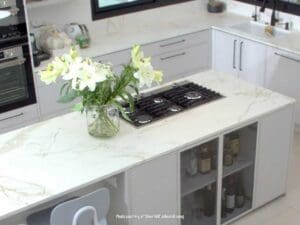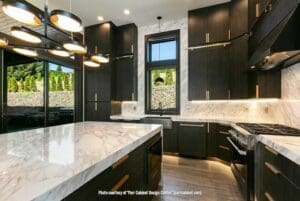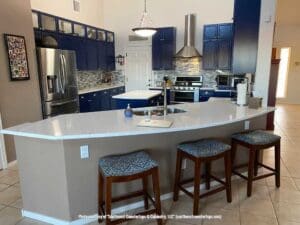Kitchen Countertop Options: A Comprehensive Guide
Introduction
A kitchen worktop is more than just a work surface. It is the soul of your kitchen, its style, that sets mood and even reflects the style of the homeowners.
Choosing the perfect kitchen worktop can feel overwhelming. You start with a simple question—‘What should I know to pick the right material?’—only to find yourself buried in endless online articles, conflicting advice from friends, and even more uncertainty.
To save you from endless surfing on the Internet and save your nerves and time, our experts have conducted a study and created a guide that contains answers to the most important questions: what are the features of each material for kitchen countertops, which best fits a family with children and which countertop will not only last for years but also handle all your culinary adventures
After reading this article, you’ll feel confident in your choice—not just because it’s obvious, but because it’s the right one for you. You’ll know exactly which countertop will fit your home perfectly—one that’s functional, stylish, and designed to match your lifestyle.
1. Natural Stone Guide: Granite, Marble, and Quartzit
Natural stone is a symbol of eternal durability and natural beauty. Each of its types is a unique mixture of features that turn kitchen countertops into a real work of art.
Before we dive into the key advantages and features of natural stone, we invite you to explore our “Average Cost”, blog section. There, you'll find detailed research and insights on countertop pricing in your city.
(!) In our research we take the prices of quartz countertops as a basis, however, based on the data obtained, we can determine the cost of countertops for natural stones.
1.1. Granite is an igneous rock formed millions of years ago by high temperatures and pressure deep within the Earth. Quarried in regions across the globe, including the United States, Brazil, India, and China. This material is renowned for its durability and variety of natural patterns. Colors range from classic gray and black to exotic shades of pink, blue and green. Granite countertops are considered a symbol of reliability and luxury.
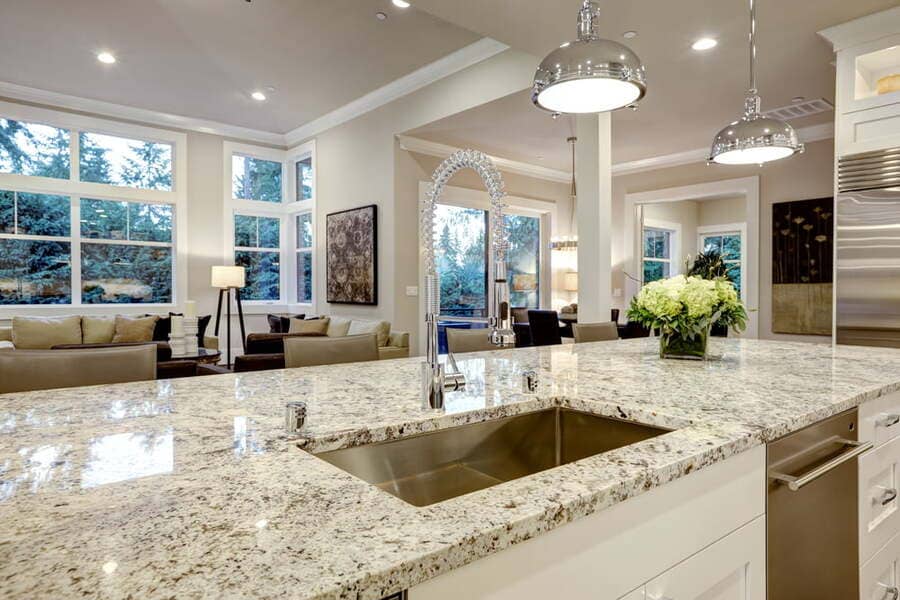
Photo courtesy of “Creative Granite & Design” (creativegranite.com)
|
Advantages |
Disadvantages |
|
|
1.2. Marble is a metamorphic rock formed through the recrystallization of limestone under heat and pressure. It is quarried in Italy, Turkey, Greece, and even in the United States. Marble is known for its elegant veins that make each slab unique. This material is associated with luxury and sophistication.
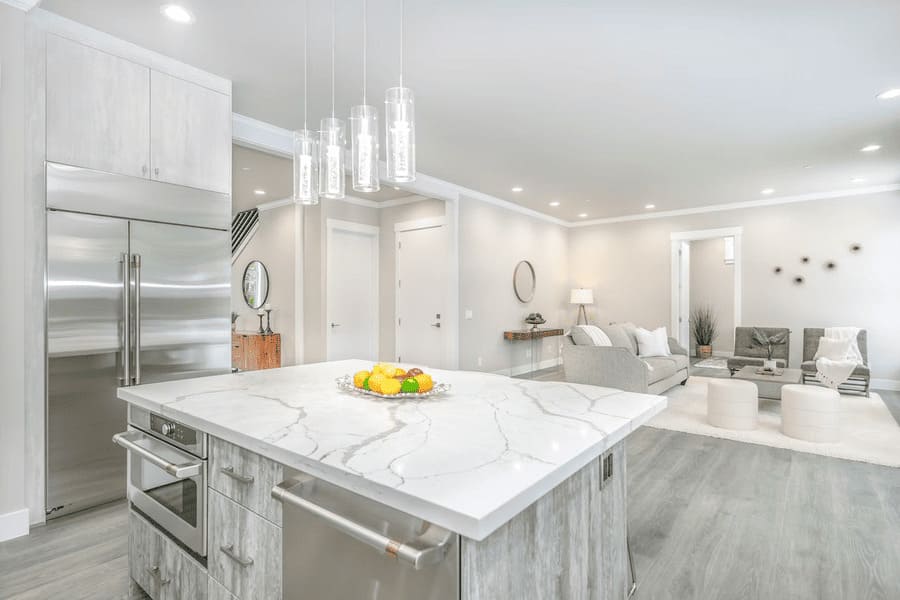
Photo courtesy of “Stoneworx” (stoneworx.com)
|
Advantages |
Disadvantages |
|
Marble is the epitome of elegance and sophistication. Its appearance attracts with its smooth texture and luxurious patterns. |
It is much more porous than granite, making it prone to stains and scratches. Even a drop of lemon juice can leave a mark if not removed in time. Marble is also sensitive to acids and requires more delicate care: regular sealing and the use of special cleaning products |
An ideal choice for those who value elegance and place aesthetics at the forefront.
1.3. Quartzite is a metamorphic rock composed mainly of quartz, making it one of the most durable natural stones. This material is quarried in the United States, Brazil, and South Africa. Quartzite resembles marble in appearance, but far surpasses it in durability. Its delicate shades of white, gray and cream are accented with natural veining, giving it the elegant look of high-end marble
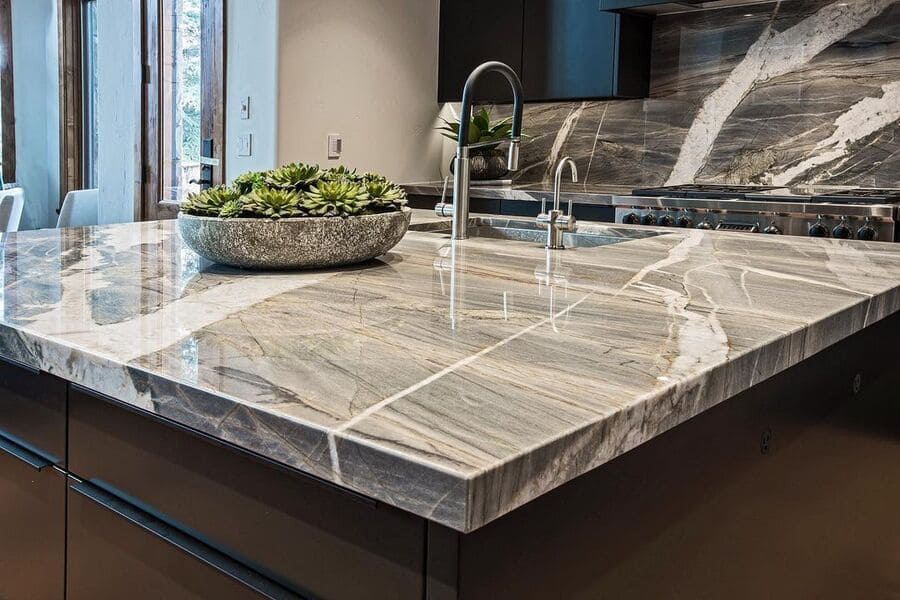
Photo courtesy of “Park Industries” (parkindustries.com)
|
Advantages |
Disadvantages |
|
|
This makes it a great choice for families where the kitchen is actively used every day.
2. Engineered Stone: Quartz and Dekton
2.1. Quartz is an engineered material made from natural quartz sand, resins, and pigments. It is formed under industrial conditions under high pressure and temperature, making it extremely durable and resistant to external influences. The advanced manufacturing process allows quartz to come in a diverse range of colors and textures that mimic natural stone, but with added benefits.
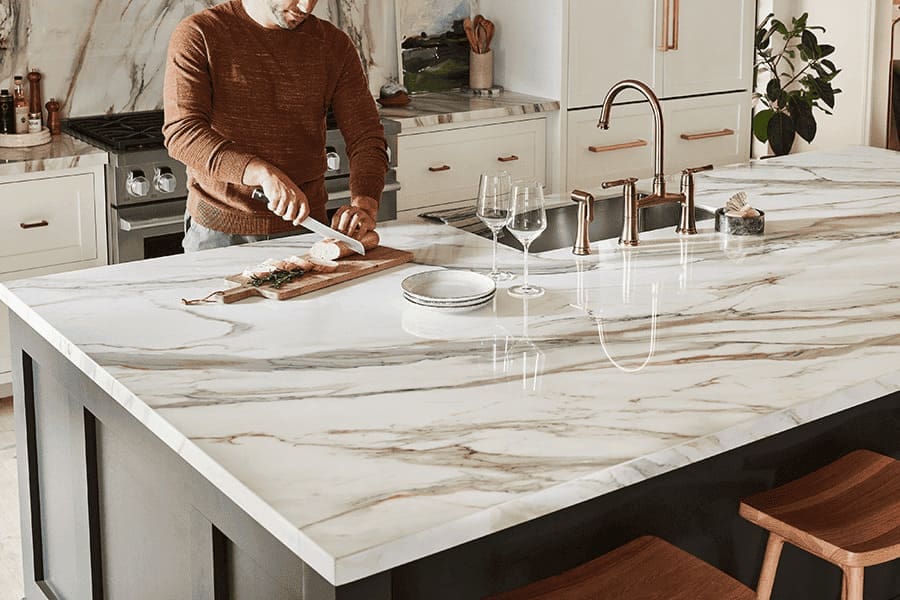
Photo courtesy of “Boss Design Center” (bossdesigncenter.com)
|
Advantages |
Disadvantages |
|
|
Perfect for families with children, as it is easy to clean, highly stain-resistant, and safe for everyday use.
If you're looking for a detailed quote on quartz countertops, we have great news! Our experts have done the research (and still do up to now) to find out the exact cost of quartz countertops in US cities. Go to our “Average Cost" section of the blog and choose your city!
2.2. Dekton is an innovative composite material created by synthesizing raw materials used in the production of glass, ceramic and quartz. Manufactured through ultra-compact pressing technology—where materials are combined under extreme pressure and heat—it results in an exceptionally strong, damage-resistant surface.
This material is considered the peak of modern technology and is ideal for minimalist kitchens.
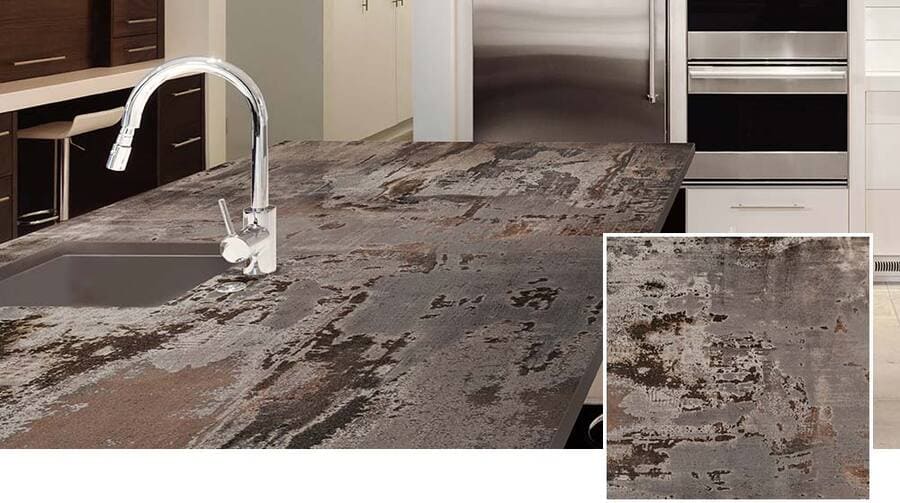
Photo courtesy of “Baczewski Luxury Cabinets” (baczewskiluxury.com)
|
Advantages |
Disadvantages |
|
|
Ideal for modern kitchens where style, innovation and durability are important. Great for those who want a minimalistic and high-tech design.
3. Wood
Wooden countertops add warmth and coziness to any space, making them a perfect fit for country, Scandinavian, and eclectic kitchen designs.
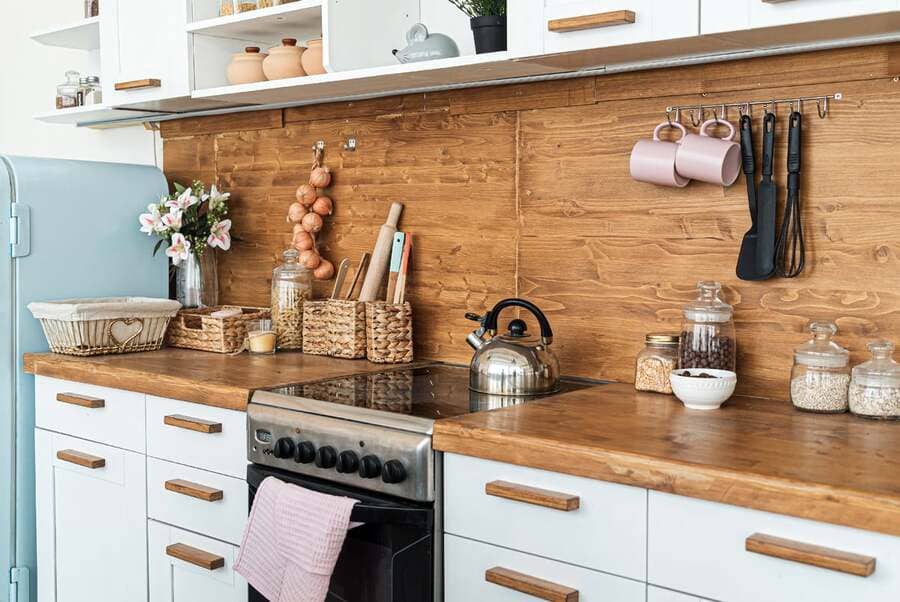
Photo courtesy of “Hardwood Lumber Company” (hardwood-lumber.com)
|
Advantages |
Disadvantages |
|
|
A great choice for those who appreciate sustainability, cozy interior and are prepared to maintain the surface properly
4. Laminate
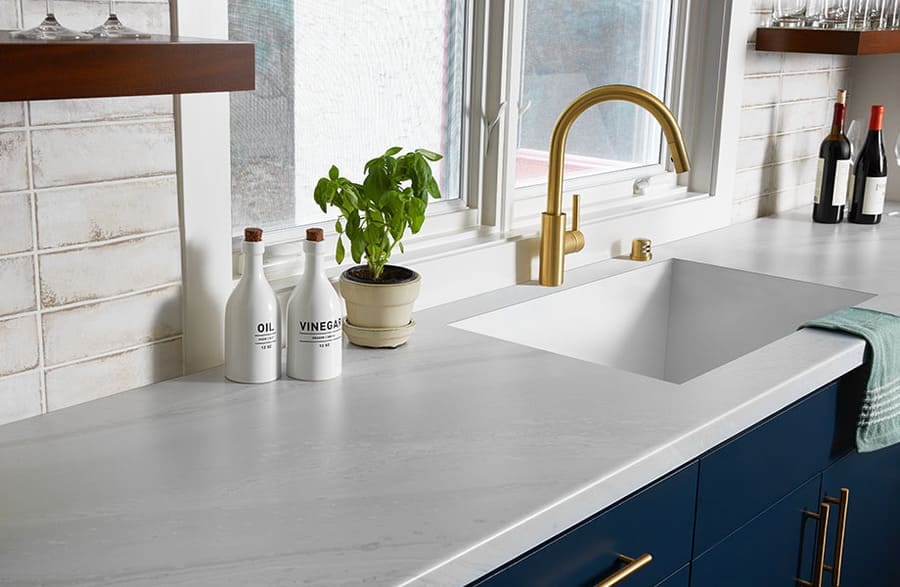
Photo courtesy of “Formica Corporation” (formica.com)
|
Advantages |
Disadvantages |
|
|
Ideal for budget-friendly renovations or those seeking a temporary kitchen solution.
5. Stainless steel
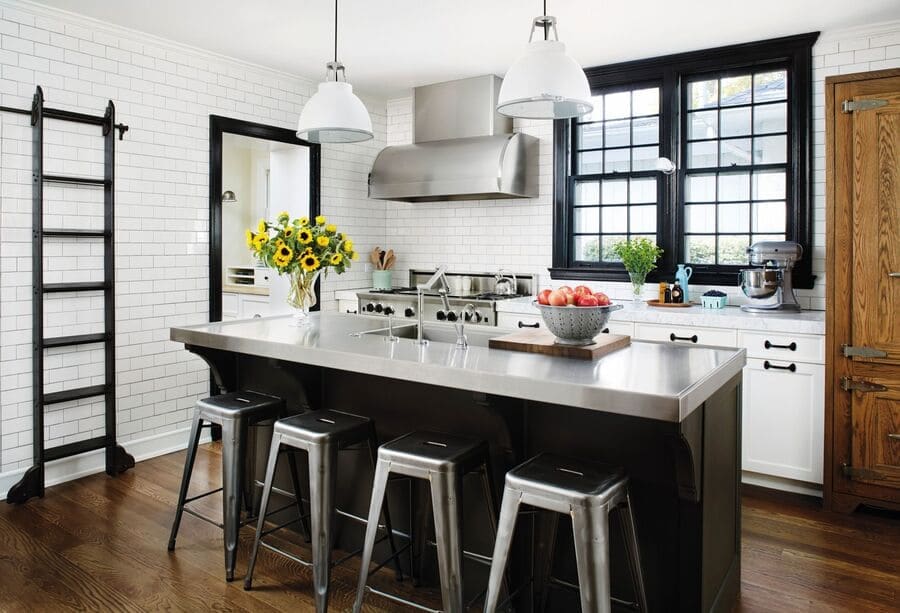
Photo courtesy of “Better Homes & Gardens” (bhg.com)
|
Advantages |
Disadvantages |
|
|
Perfect for minimalist and industrial interiors, as well as for those who prioritize practicality and superior hygiene.
6. Best Countertop for Long-Term Value
When selecting a countertop, it’s essential to consider not just your current needs but also how it will impact your home’s value in the future. For instance, how will your choice of material influence resale value when it’s time to sell?
Materials like granite, quartz, and Dekton are considered top-tier investments due to their durability, aesthetic appeal, and strong association with luxury and prestige. These surfaces not only enhance everyday functionality but also make a lasting impression on potential buyers.
By choosing one of these premium materials, you’re investing in a countertop that will retain its beauty, withstand years of use, and elevate your home’s overall value—making it more attractive to high-end buyers.
Conclusion: How to Choose the Perfect Countertop?
Choosing the right countertop is more than just selecting a material, color, or texture—it’s an investment in your home’s comfort, aesthetics, and long-term value. By now, you understand that every kitchen is unique, and your countertop should not only complement your lifestyle and budget but also stand the test of time.
For timeless elegance and durability, quartz or granite are excellent choices, offering decades of beauty while elevating your kitchen’s style.
For innovation and resilience, Dekton provides cutting-edge technology with exceptional strength and low maintenance.
For warmth and sustainability, a wooden countertop brings natural charm and a cozy, inviting feel.
Above all, remember: a countertop is more than just a surface. It’s where you prepare meals, create memories, and gather with loved ones. Choose one that not only enhances your space but also inspires you daily and lasts for years to come.
Let your countertop be a reflection of your personality, your love for home, and your commitment to quality





